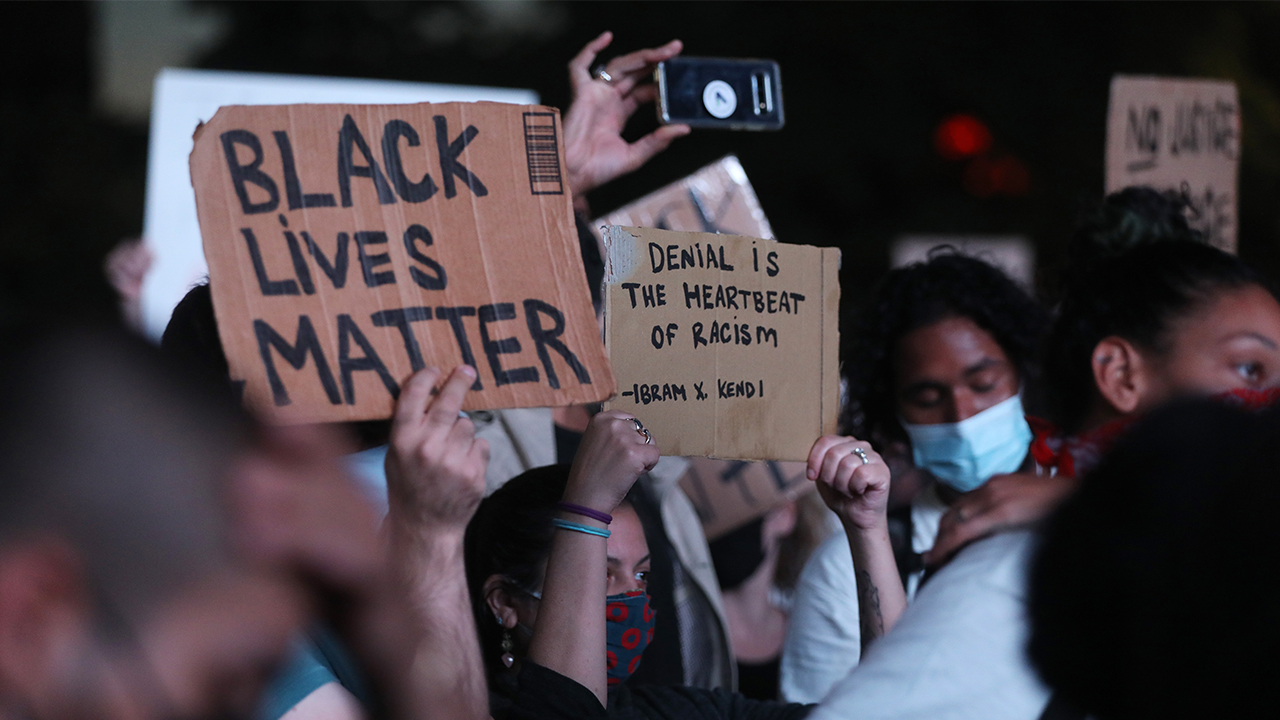
Pew Research Center conducted this study to better understand Americans’ outlook on racial equality amid increased attention to this issue following George Floyd’s death and explore whether attitudes have changed since 2019. For this analysis, we surveyed 10,093 U.S. adults from Sept. 8 to 13, 2020. Everyone who took part is a member of the Center’s American Trends Panel (ATP), an online survey panel that is recruited through national, random sampling of residential addresses. This way nearly all U.S. adults have a chance of selection. The survey is weighted to be representative of the U.S. adult population by gender, race, ethnicity, partisan affiliation, education and other categories. Read more about the ATP’s methodology.
Here are the questions used for this analysis, along with responses, and its methodology.
References to White, Black and Asian adults include only those who are not Hispanic and identify as only one race. Hispanics are of any race.
All references to party affiliation include those who lean toward that party. Republicans include those who identify as Republicans and independents who say they lean toward the Republican Party. Democrats include those who identify as Democrats and independents who say they lean toward the Democratic Party.
References to college graduates or people with a college degree comprise those with a bachelor’s degree or more. “Some college” includes those with an associate degree and those who attended college but did not obtain a degree.
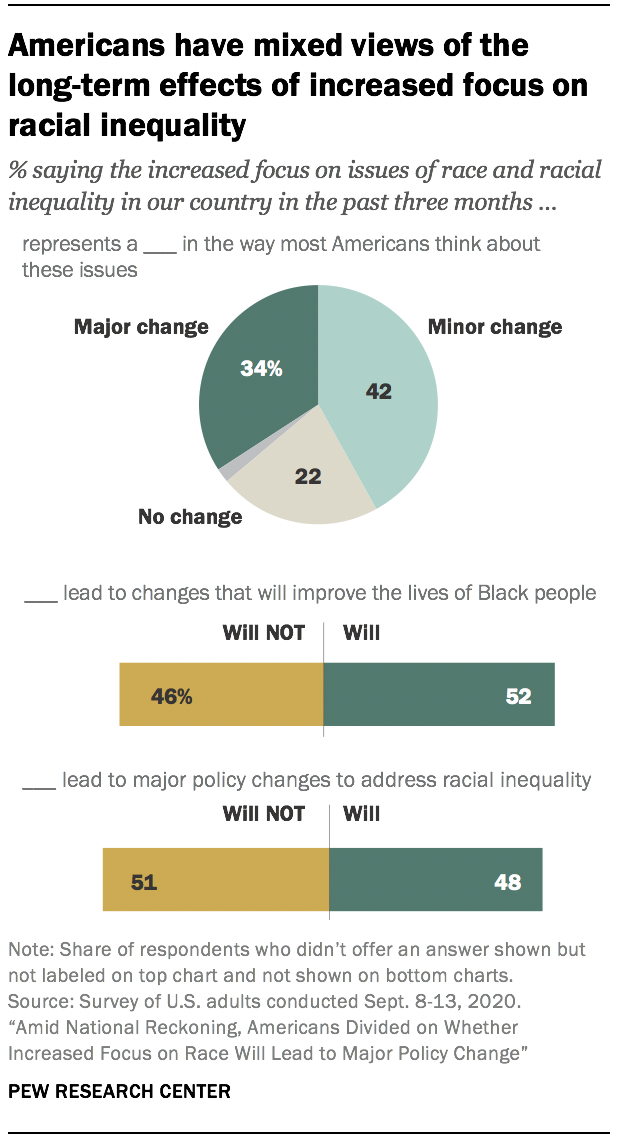
A series of high-profile incidents of police violence against Black Americans in recent months, including the killing of George Floyd and the shooting of Jacob Blake, have sparked nationwide protests, renewed calls for the removal of Confederate symbols and produced public condemnations of systemic racism from lawmakers, corporations, sports leagues and others. Yet many Americans are skeptical that this moment of racial reckoning will lead to major changes in the United States, according to a new Pew Research Center survey.
The public is about evenly split on whether the increased focus on issues of race and racial inequality in the country in the past three months will lead to major policy changes to address racial inequality (48% say it will and 51% say it will not). A sizable share (46%) say this will not lead to changes that will improve the lives of Black people. And while a majority say the heightened attention to racial issues represents a change in the way most Americans think about these issues, just 34% say this represents a major change.
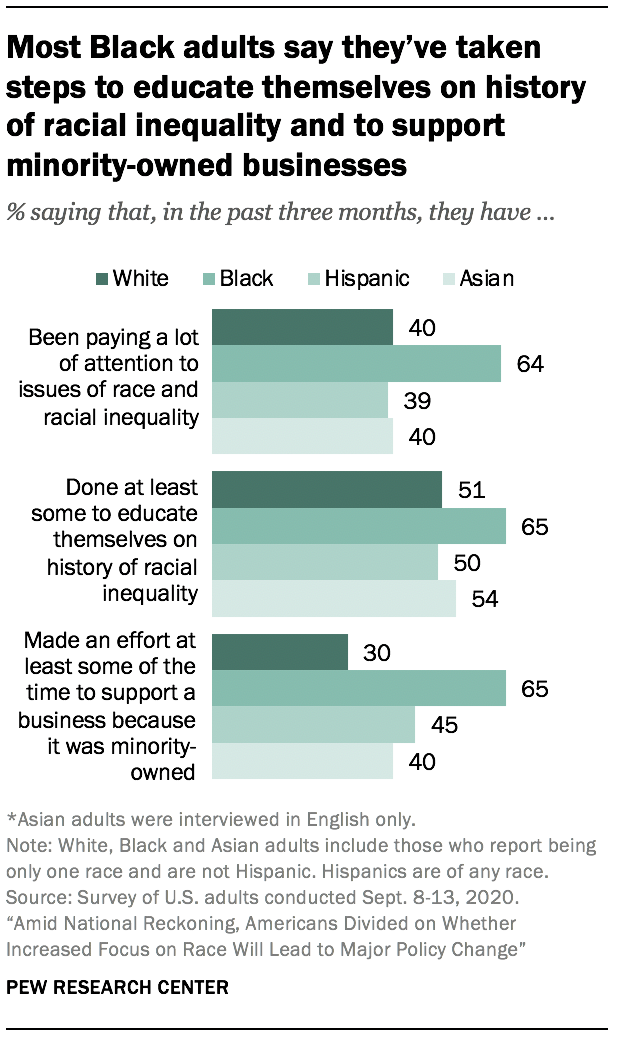
The events of the past several months have galvanized Black Americans more so than other racial and ethnic groups. A majority of Black adults (64%) say they have been paying a lot of attention to issues of race and racial inequality in the past three months, and 59% say they have been paying more attention to these issues than they did before. In contrast, about four-in-ten White, Hispanic and Asian adults say they have been paying a lot of attention to issues of race and racial inequality. Black Americans are also more likely than White, Hispanic and Asian Americans to say they’ve taken steps to educate themselves about the history of racial inequality in the country and that they’ve made efforts to support minority-owned businesses in recent months.
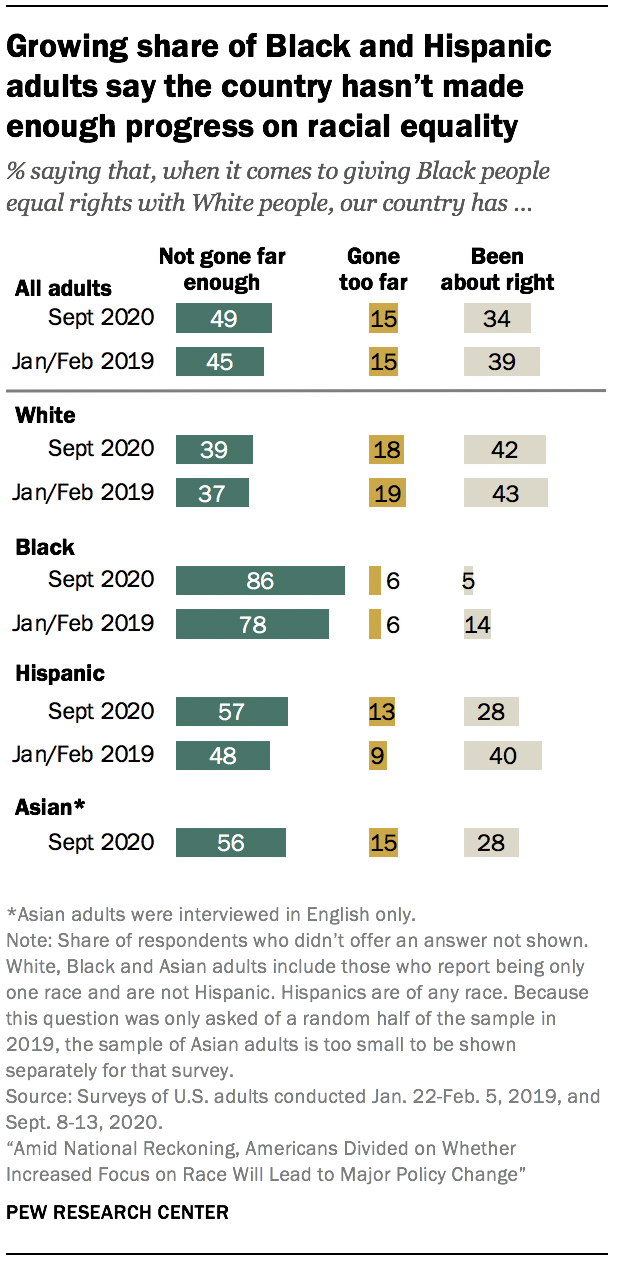
Views of the country’s progress on racial equality have become more negative in the past year, particularly among Black and Hispanic adults and Democrats across racial and ethnic groups. Overall, 49% of U.S. adults now say the country hasn’t gone far enough when it comes to Black people having equal rights with White people, up from 45% in early 2019. Among Black Americans, an even larger share say this is the case today than did so in 2019 (86% vs. 78%). And while a majority of Hispanics (57%) now say the country hasn’t gone far enough in this regard, 48% said the same last year. Meanwhile, the views of White Americans are virtually unchanged.1
Among Democrats and Democratic leaners, 78% say the country hasn’t gone far enough when it comes to Black people having equal rights with White people, up from 66% in 2019. In contrast, just 17% of Republicans and those who lean to the GOP say this, similar to the share that did so last year (18%). The shares saying the country hasn’t gone far enough are up by 8 percentage points among Black Democrats, 12 points among White Democrats and 13 points among Hispanic Democrats.
In general, the partisan gaps on issues related to race remain wide and persistent, even after taking into account the racial composition of the parties. Whether looking at the treatment of Black adults relative to White adults, the amount of attention paid to racial issues in this country or the importance of this moment, White Democrats and Republicans have vastly different views.2
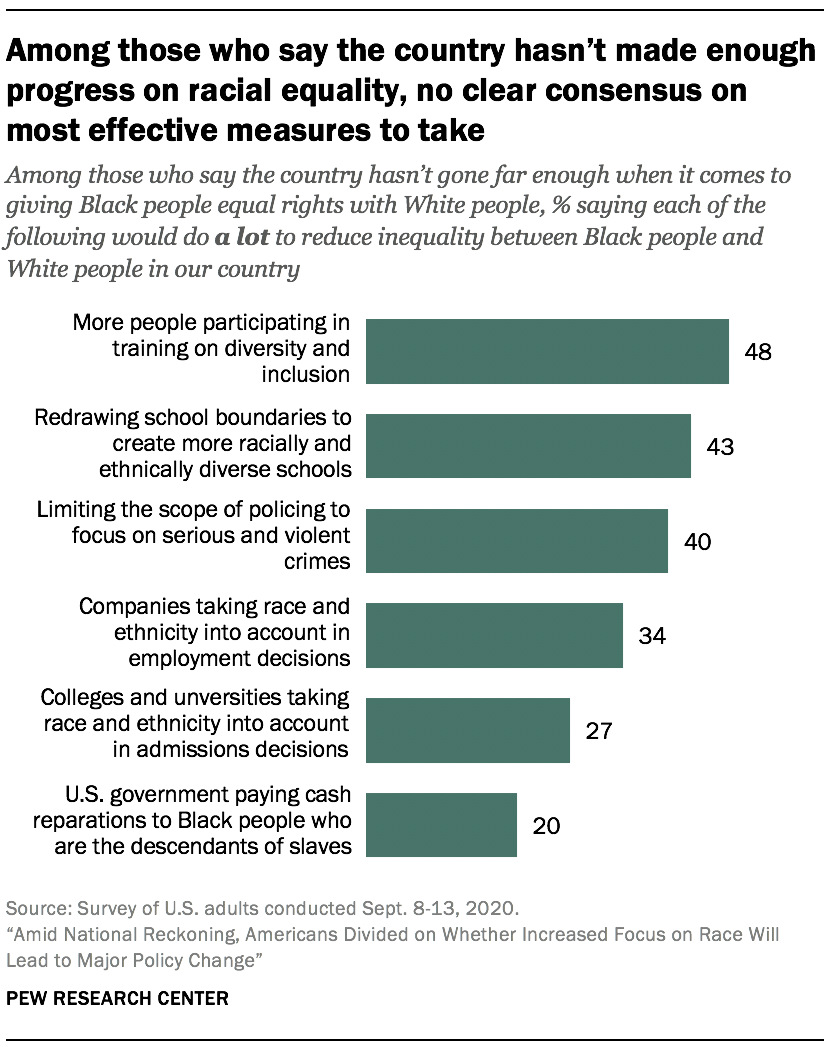
There’s no clear consensus about which measures would be most effective in reducing racial inequality. Among those who say the country hasn’t made enough progress on racial equality, about half (48%) say more people participating in diversity and inclusion training would do a lot to reduce inequality between Black people and White people. Roughly four-in-ten say the same about redrawing school boundaries to create more diverse schools and limiting the scope of policing to focus on serious and violent crimes. Smaller shares say companies and organizations taking race and ethnicity into account in decisions about hiring and promotions, colleges and universities taking these factors into account in decisions about admissions and the U.S. government paying cash reparations to Black people who are the descendants of slaves would do a lot to reduce racial inequality.
With the exception of limiting the scope of policing, Black adults who say the country hasn’t made enough progress on racial equality are more likely than their White counterparts to say each measure would do a lot to reduce racial inequality. Black adults are also more likely than Hispanic and Asian adults to say companies and organizations taking race and ethnicity into account in decisions about hiring and promotions, colleges and universities taking these factors into account in decisions about admissions and cash reparations would do a lot to reduce racial inequality. These racial and ethnic differences persist among Democrats on some items.
The nationally representative survey of 10,093 U.S. adults was conducted Sept. 8-13, 2020, using the Center’s American Trends Panel.3 Among the other key findings:
About half of Americans say it is very important for people in the U.S. to educate themselves about the history of racial inequality in the country. Black adults are particularly likely to see this as very important: 78% say this, compared with about half or less of Hispanic (51%), Asian (43%) and White (42%) adults. Majorities of Black adults also say it’s very important for people in the U.S. to confront other people when they say or do something racist (63%), have conversations about race with people who are not the same race as them (60%) and support businesses that are owned by racial or ethnic minorities (58%). Far smaller shares of White, Hispanic and Asian adults see each of these as very important.
Black Americans are more likely now than in 2019 to say being Black puts people at a disadvantage in our society and that being White helps. About eight-in-ten Black adults (81%) say being Black hurts a person’s ability to get ahead in the U.S. at least a little, up from 68% in 2019. At the same time, 81% of Black adults say being White helps a person’s ability to get ahead, compared with 69% who said the same last year. A growing share of Hispanics also say being Black puts people at a disadvantage, but views on whether being White helps have not changed significantly among this group. Views on how being Black or White impacts a person’s ability to get ahead have remained stable among White and Asian adults. Overall, 58% of Americans say being Black hurts a person’s ability to get ahead and 55% say the same about being Hispanic. In contrast, most Americans (60%) say being White helps.
Americans are now more likely to say Black people are treated less fairly than White people when seeking medical treatment. Amid continued reports of the disproportionate health impact of the coronavirus outbreak on Black people and other racial and ethnic minorities, 42% of Americans now say Black people are treated less fairly than White people when seeking medical treatment, up from 33% in 2019. The shares saying this have grown among White, Black and Hispanic Americans. For example, 76% of Black adults say this today, compared with 59% last year. There has also been an uptick in the share of Americans who say Black people are treated less fairly than White people when applying for a loan or mortgage (49% today vs. 45% in 2019), while perceptions of how Black people are treated in dealing with police, in hiring, pay and promotions, in stores or restaurants and when voting in elections are more stable among all adults. Black Americans are more likely than they were in 2019 to say Black people are treated less fairly than White people in each of these areas.
As in 2019, most Black adults who say the country has work to do on racial equality are skeptical about the prospects for change. About two-thirds of Black adults (65%) who say the country hasn’t gone far enough when it comes to Black people having equal rights with White people say it’s not too or not at all likely that the country will eventually achieve racial equality. In contrast, 74% of White adults and 56% of Hispanics who say the country hasn’t made enough progress in this area say it is at least somewhat likely that Black people will eventually have equal rights with White people. These differences persist among Democrats, with White and Hispanic Democrats who say the country hasn’t gone far enough when it comes to racial equality far more likely than Black Democrats to say it’s likely this will happen eventually. White Democrats are also more likely than Black Democrats to say the increased focus on race over the past three months will lead to major policy changes to address racial inequality and to improvements in the lives of Black people.
Social media users whose friends or family members have expressed opposition to racism on social media in the past three months see a mix of motivations for these posts. Most social media users (62%) say at least some of their friends and family members have expressed opposition to racism or racial inequality on social media in the past three months; 19% say a few have and 19% say none of their friends or family members have done this. Among those who say at least a few of their friends or family members have expressed opposition to racism on social media in recent months, three-quarters say at least some were motivated by a genuine concern about the treatment of Black people, with 36% saying all or most were motivated by this. A smaller share – but still a majority (58%) – say at least some of their friends and family members were motivated by social pressure to do so. Social media users younger than age 30 are more likely than older social media users to say at least some of their friends or family members who have expressed their opposition to racism on social media in the past three months were motivated by social pressure.
This survey includes a total sample size of 303 Asian Americans. The sample includes English-speaking Asian Americans only and, therefore, may not be representative of the overall Asian American population (72% of our weighted Asian American sample was born in another country, compared with 77% of the Asian American adult population overall). Despite this limitation, it is important to report the views of Asian Americans on the topics in this study. As always, Asian Americans’ responses are incorporated into the general population figures throughout this report. Because of the relatively small sample size and a reduction in precision due to weighting, results are not shown separately for Asian Americans for questions that were only asked of a random half of respondents. We are also not able to analyze Asian American respondents by demographic categories, such as gender, age or education. For more, see “Polling methods are changing, but reporting the views of Asian Americans remains a challenge.”
Most Americans see recent increased focus on issues of race as a turning point; about half say it will result in policy and societal changes
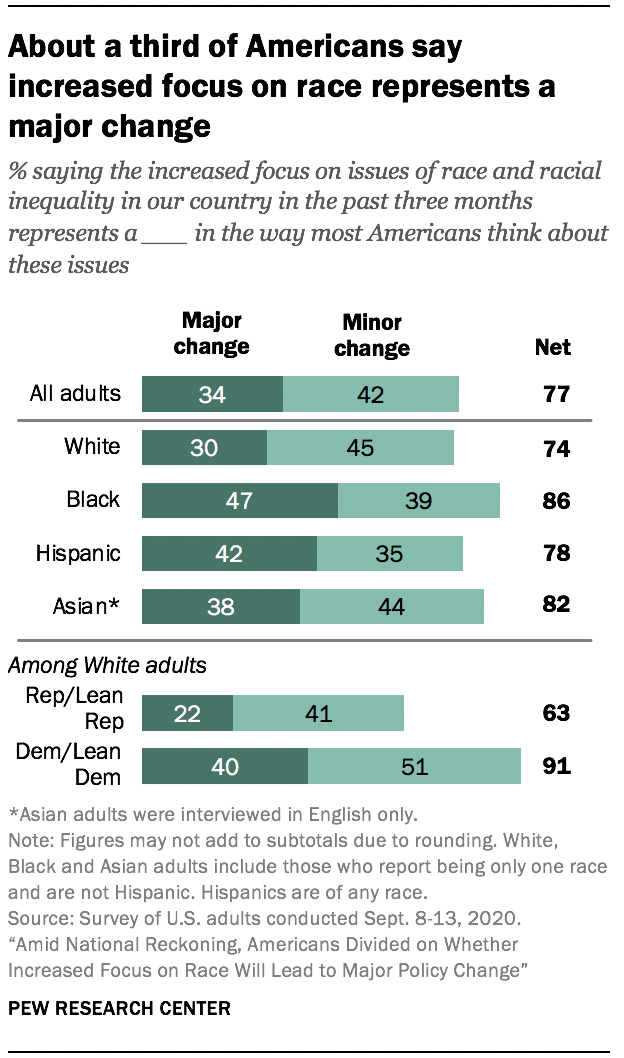
The new survey finds that 34% of the public says the recent increased focus on issues of race and racial inequality sparked by George Floyd’s death at the hands of a White police officer in May of this year represents a major change in the way most Americans think about these issues. An additional 42% say this represents a minor change.
Black (47%), Hispanic (42%) and Asian (38%) adults are more likely than White adults (30%) to say the increased focus on race in the past three months marks a major change in Americans’ thinking about race.
Older Black adults are particularly likely to see a major change. Among those ages 50 and older, 53% say there has been a major change in the past three months in how most Americans think about race, compared with 41% of Black adults younger than 50. There are no notable differences by age among other racial and ethnic groups.
Some 43% of Democrats and those who lean toward the Democratic Party say the events of the past three months represent a major change in how the public thinks about racial issues, compared with 24% of Republicans and Republican leaners. These differences remain when looking only at White adults.
Democrats far more likely than Republicans to say recent focus on race will result in policy and societal changes
The public is split on whether the increased focus on race sparked by Floyd’s death will result in major policy changes to address inequality: 48% say it will and 51% say it will not. And while about half (52%) say that it will lead to changes that improve the lives of Black people, a smaller but still sizeable share (46%) say that it will not.
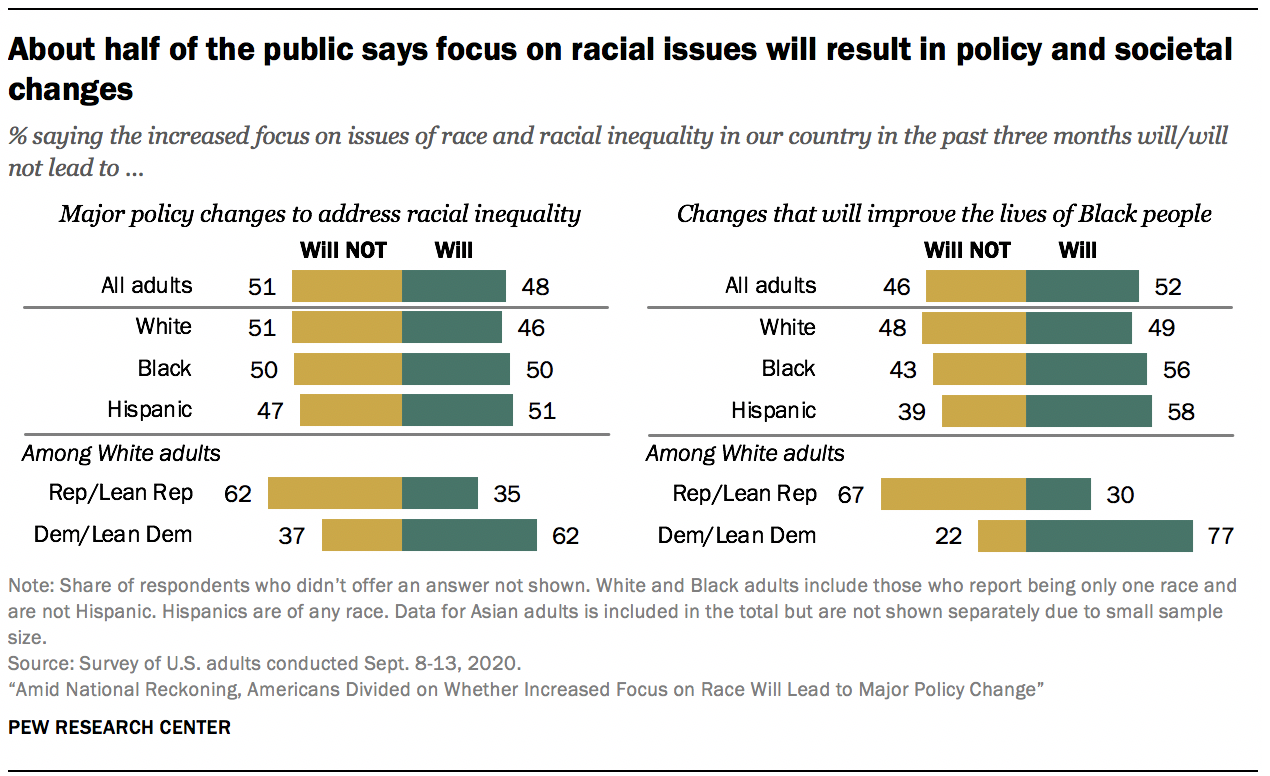
Views on these questions vary little, if at all, by race and ethnicity. For example, 46% of White adults, 50% of Black adults and 51% of Hispanic adults say this new focus on race will result in major policy changes.
The gaps in views by political party are vast. About six-in-ten Democrats (59%) say that the focus on race will lead to major policy changes to address racial inequality, compared with only 36% of Republicans. Democrats are more than twice as likely as Republicans to say this will lead to an improvement in the lives of Black people (70% vs. 31%). Again, these disparities hold up when controlling for race and ethnicity.
Among Democrats, White adults (77%) are significantly more likely to say that the new focus on race over the past three months will lead to improvements in Black people’s lives than are their Black (60%) and Hispanic (66%) counterparts. White Democrats (62%) are also more likely than Black Democrats (53%) to say it will lead to major policy changes.
Compared with other racial and ethnic groups, Black adults are more engaged in racial issues and have done more in recent months to educate themselves about the history of inequality
The death of George Floyd and the protests that followed came during an intense news cycle that included a pandemic, a presidential election and a floundering economy. Even so, public interest in issues of race and racial inequality has been relatively robust. Among all adults, 43% say they have been paying a lot of attention to these issues over the past three months, and an additional 35% say they’ve been paying some attention. Roughly one-in-five (22%) say they’ve been paying only a little or no attention.
By comparison, about half (52%) say they’ve been paying a lot of attention to the coronavirus outbreak, 44% have been paying a lot of attention to the presidential election and 40% say the same about what’s been happening with the economy.
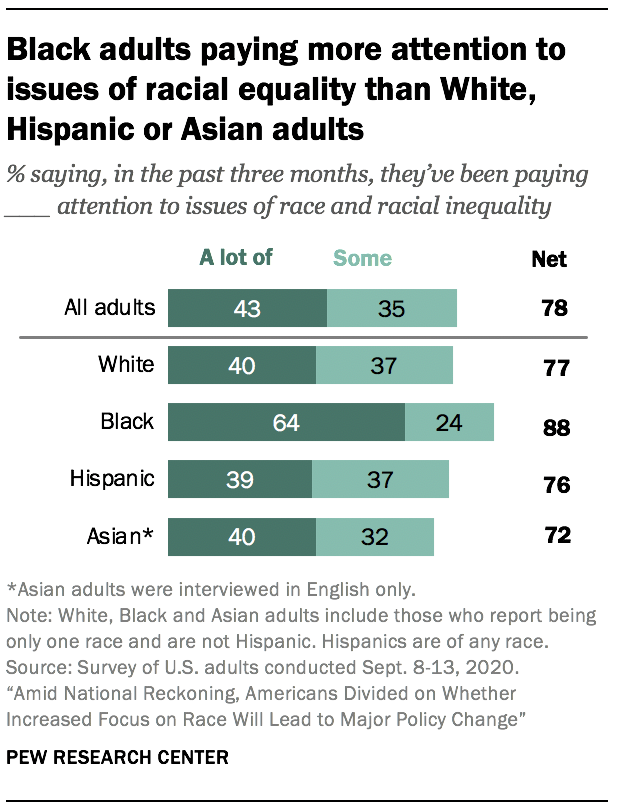
Attention to issues of race and racial inequality varies considerably by race and ethnicity. While 64% of Black adults say they have been paying a lot of attention to these issues in recent months, the share is significantly smaller among White (40%), Hispanic (39%) and Asian (40%) adults.
Among White adults, Democrats and those who lean Democratic are more than twice as likely as Republicans and Republican leaners to say they’ve been paying a lot of attention to racial issues recently (60% of Democrats vs. 27% of Republicans).
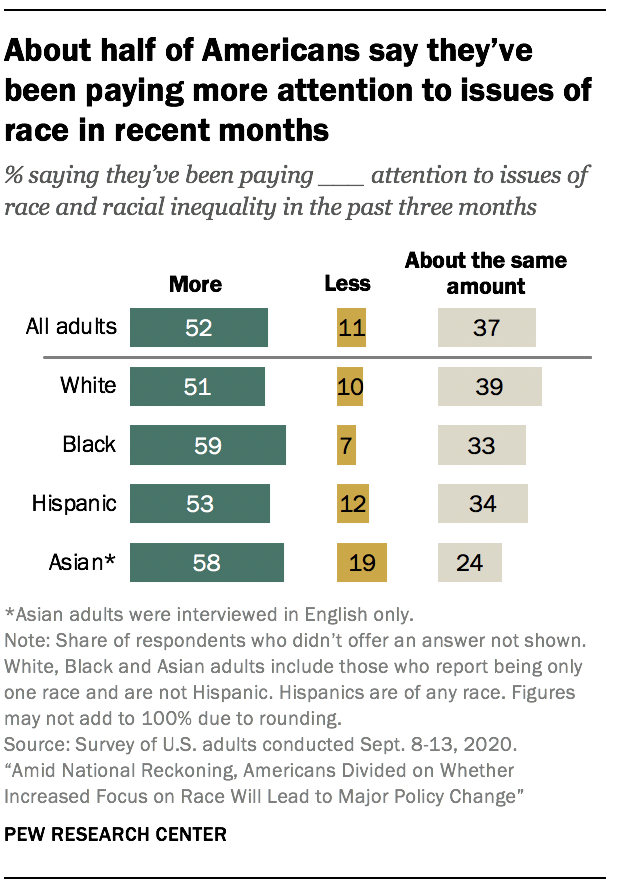
About half of all Americans say their attention to these issues has increased recently: 52% say they have they have been paying more attention to issues of race and racial inequality over the past three months than they did before. About one-in-ten (11%) say they’ve been paying less attention to these issues, and 37% say they’ve been paying about the same amount of attention. Among those who say they’ve been paying a lot of attention to these issues in recent three months, most indicate that their current level of engagement is higher than in the past: 70% say they’re paying more attention to these issues now than they did before.
Black adults are more likely than White adults to say they’ve been paying more attention to these issues in recent months (59% vs. 51%).
Again, there is a substantial partisan gap among White adults: 69% of White Democrats say they’ve been paying more attention to racial issues in recent months, compared with 39% of White Republicans.
White adults are less likely than other racial and ethnic groups to say they talk about race with people who are not the same race as them
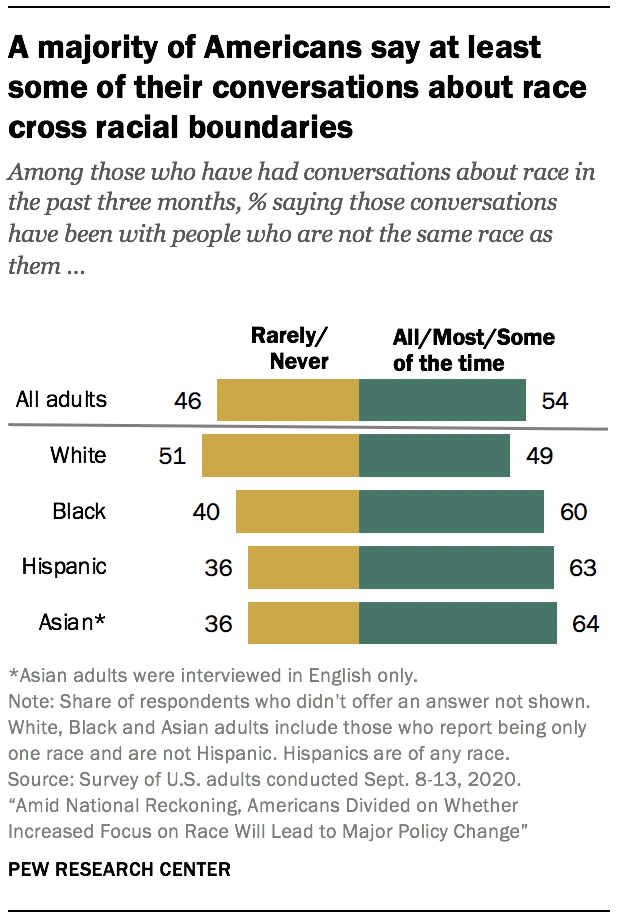
A majority of adults who have had conversations about race in the past few months (54%) say that, at least some of the time, those conversations have been with people who are not the same race as them (just 10% say this has been the case all or most of the time). Still, a sizable share (46%) say these conversations have rarely or never been with someone of a different race.
Black, Hispanic and Asian adults who’ve had conversations about race recently are more likely than White adults to say at least some of the time they’ve been with people who are a different race from them. Majorities of Black (60%), Hispanic (63%) and Asian adults (64%) say this compared with 49% of White adults.
There is an age gap as well, among both Black and White adults. While two-thirds of Black adults ages 18 to 49 who’ve had conversations about race recently say at least some of those conversations have been with people who are a different race from them, about half (51%) of Black adults ages 50 and older say the same. Similarly, 58% of White adults younger than 50, compared with 40% of those 50 and older, say at least some of their recent conversations about race have been with people of a different race from their own.
Beyond talking about race, many Americans say they have taken steps in recent months to educate themselves about the history of racial inequality in the U.S. Overall, 53% of adults say they’ve done at least something to educate themselves over the past three months, with 13% saying they’ve done a lot. About three-in-ten (28%) say they haven’t done much to educate themselves about racial inequality and 19% say they’ve done nothing at all.
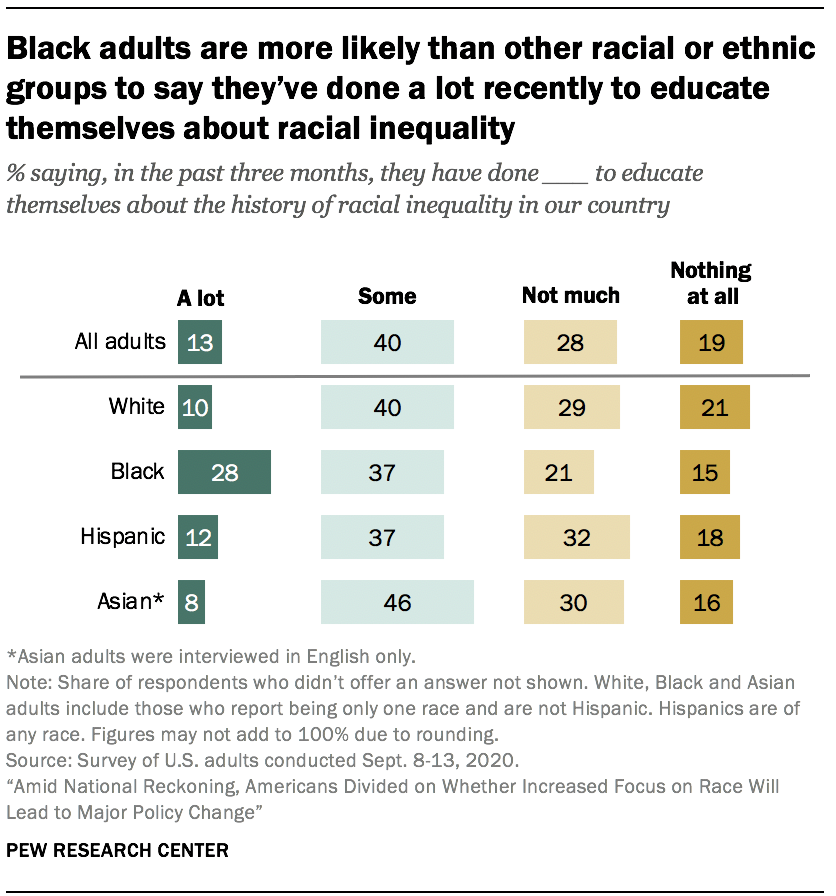
Among Black adults, 28% say they have done a lot to educate themselves about racial inequality recently. Smaller shares of White (10%), Hispanic (12%) and Asian (8%) adults say the same.
The extent to which White adults have tried to learn more about race recently varies widely by party, age and educational background. Roughly seven-in-ten White Democrats (71%) say they’ve taken at least some steps to educate themselves about racial inequities in recent months; 37% of White Republicans say the same.
Two thirds of White adults younger than 30 say they’ve done a lot or some to educate themselves about race recently. This compares with roughly half or less among older age groups. The age gap is apparent among both Republicans and Democrats, with 53% of White Republicans ages 18 to 29 and 81% of their Democratic counterparts saying they’ve taken at least some steps to educate themselves about race in recent months.
In addition, White adults with a bachelor’s degree or higher are more likely than those with less education to say they’ve done a lot or some to educate themselves on these issues (62% vs. 44%).
Support for minority-owned businesses differs widely by race and ethnicity
More than a third of Americans say, in the past three months, they have made efforts to support a business because it was owned by someone from a racial or ethnic minority group – with 7% saying they have done this all or most of the time, and 29% saying they have done this some of the time. About six-in-ten say they have rarely (24%) or never (37%) done this.
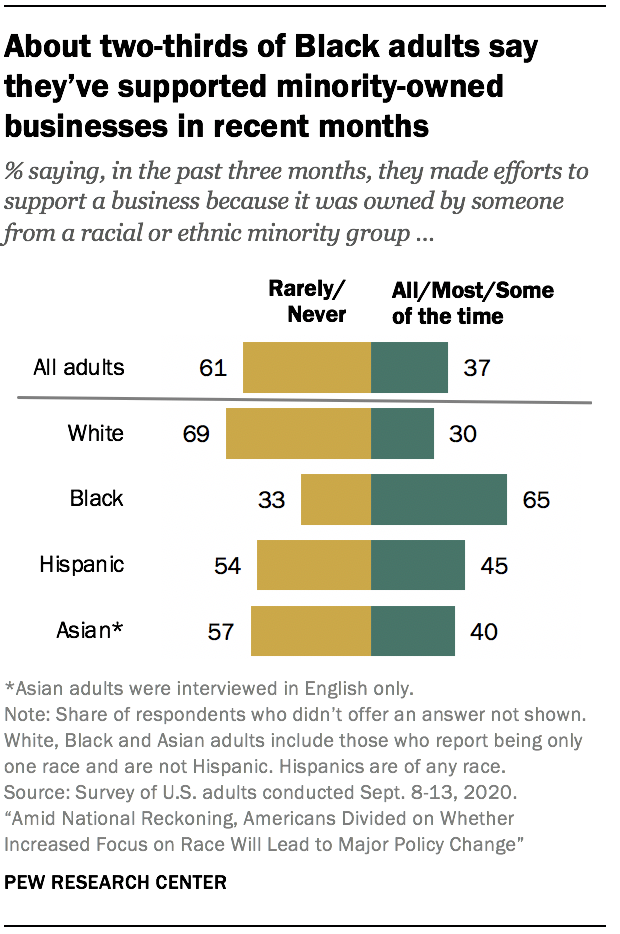
Black adults are about twice as likely as White adults to say they have made at least some effort to support minority-owned businesses in recent months (65% vs. 30%). Hispanic and Asian adults are also more likely than White adults to say they’ve made some effort to do this (45% and 40%, respectively).
Among Black adults, those with a bachelor’s degree or more education are more likely than those with less education to say they’ve supported minority-owned businesses recently (73% vs. 63%). There is a gender gap among White adults, with White women more likely than White men to say they’ve made an effort to support these types of businesses at least some of the time (34% vs. 24%). There is also a significant partisan gap among White adults: 42% of White Democrats, compared with 20% of White Republicans, say they’ve supported minority-owned businesses at least some of the time in recent months.
A majority say their friends or family have expressed opposition on social media to racism or racial inequality
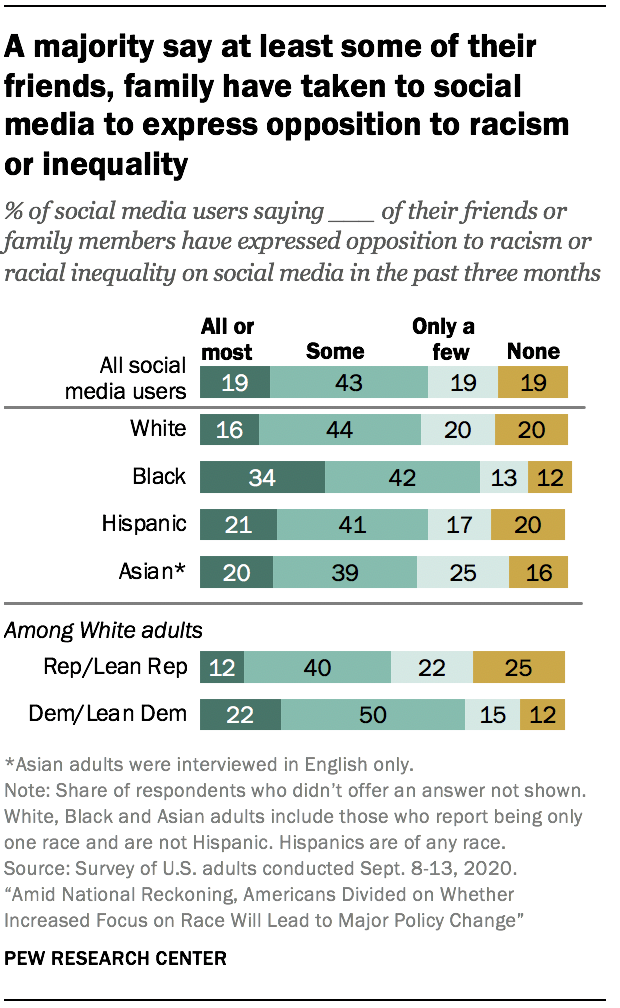
Most social media users (62%) say at least some of their friends or family members have expressed opposition to racism or racial inequality on social media in the months since Floyd’s death. The share is particularly high among Black social media users and Democratic users across racial and ethnic groups. Three-quarters of Black social media users (75%) say this, compared with 60% of White users, 62% of Hispanic users and 59% of Asian users.
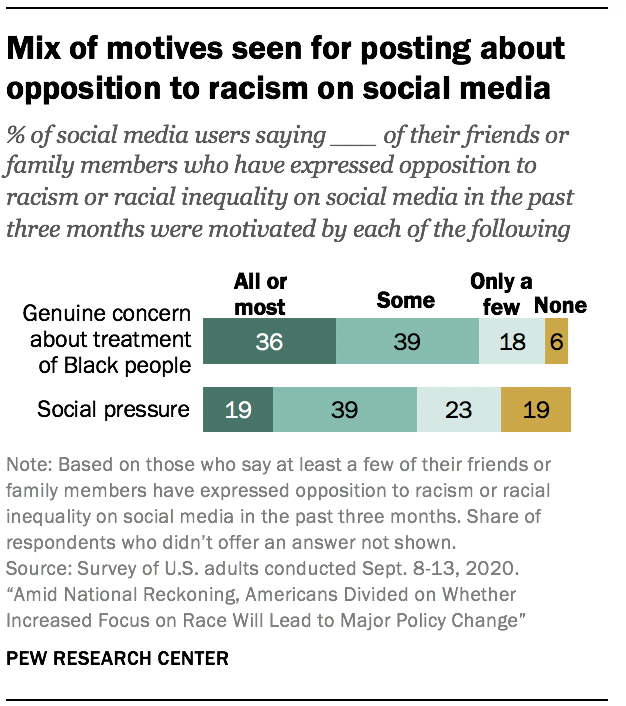
About seven-in-ten Democrats (71%) and a slight majority of Republicans (53%) who use social media also say their friends or family members have posted opposition to racism and racial inequality. The gap between Democrats and Republicans is similar among White adults.
The public sees a mix of motives for these types of social media posts. Among social media users whose friends or family have expressed opposition to racism on social media in the past three months, three-quarters say that at least some of these people were motivated by genuine concern about the treatment of Black people in our country, including 36% who say all or most were motivated by a genuine concern. Meanwhile, a smaller share – but still a majority (58%) – say at least some of their friends or family were motivated by social pressure to express their opposition to racism or racial inequality, including 19% who say this was the motivation for all or most of these people.
Black social media users whose friends or family have posted about their opposition to racism or racial inequality in the past three months are more likely than their White counterparts to say at least some were motivated by a genuine concern about the treatment of Black people (93% vs. 72%) but also to say at least some were motivated by social pressure to express their opposition (63% vs. 56%).
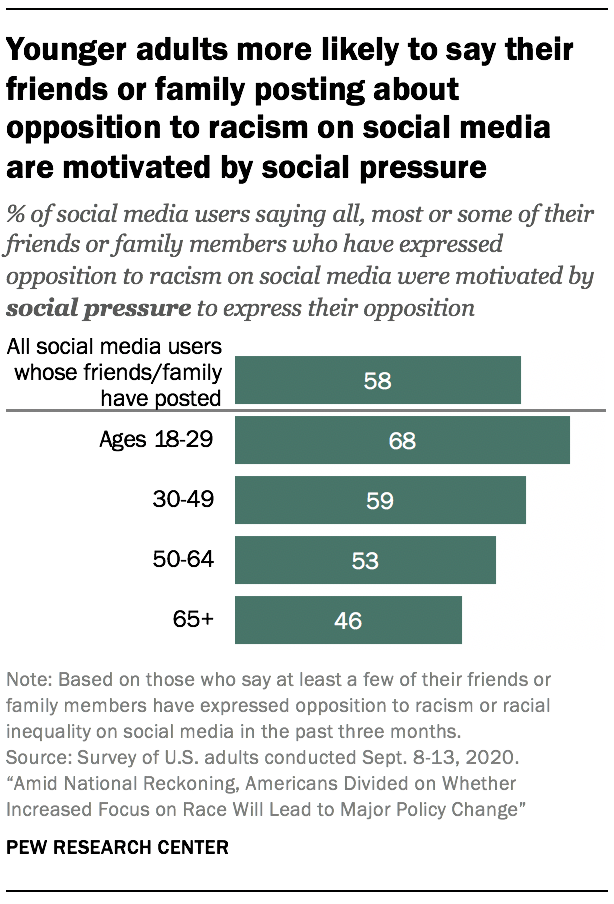
White Democrats are far more likely than their Republican counterparts to say at least some of their friends or family who have expressed opposition to racism on social media were motivated by a genuine concern about the treatment of Black people (87% vs. 59%). In turn, a larger share of White Republicans (60%) than White Democrats (51%) say at least some were motivated by social pressure.
Younger social media users whose friends or family expressed opposition to racism on social media are more likely than their older counterparts to say at least some were motivated by social pressure. About two-thirds of those ages 18 to 29 (68%) say this, compared with 59% of those 30 to 49, 53% of those 50 to 64 and 46% of those 65 and older. Meanwhile, there are no differences by age on whether these friends and family members were motivated by a genuine concern about the treatment of Black people.
Roughly eight-in-ten Black Americans say it’s very important for people in the U.S. to learn about the history of racial inequality in the country
About half of Americans (48%) say it’s very important for people to educate themselves about the history of racial inequality in the U.S. Roughly four-in-ten (42%) say it’s very important for people to confront other people when they say or do something racist, while smaller shares say the same about having conversations with people who are not the same race as them (36%), supporting businesses that are owned by racial or ethnic minorities (29%), choosing to live in communities that are racially and ethnically diverse (22%) and attending protests or rallies focused on issues related to racial equality (14%). With the exception of attending protests or rallies, majorities say each of these is at least somewhat important.
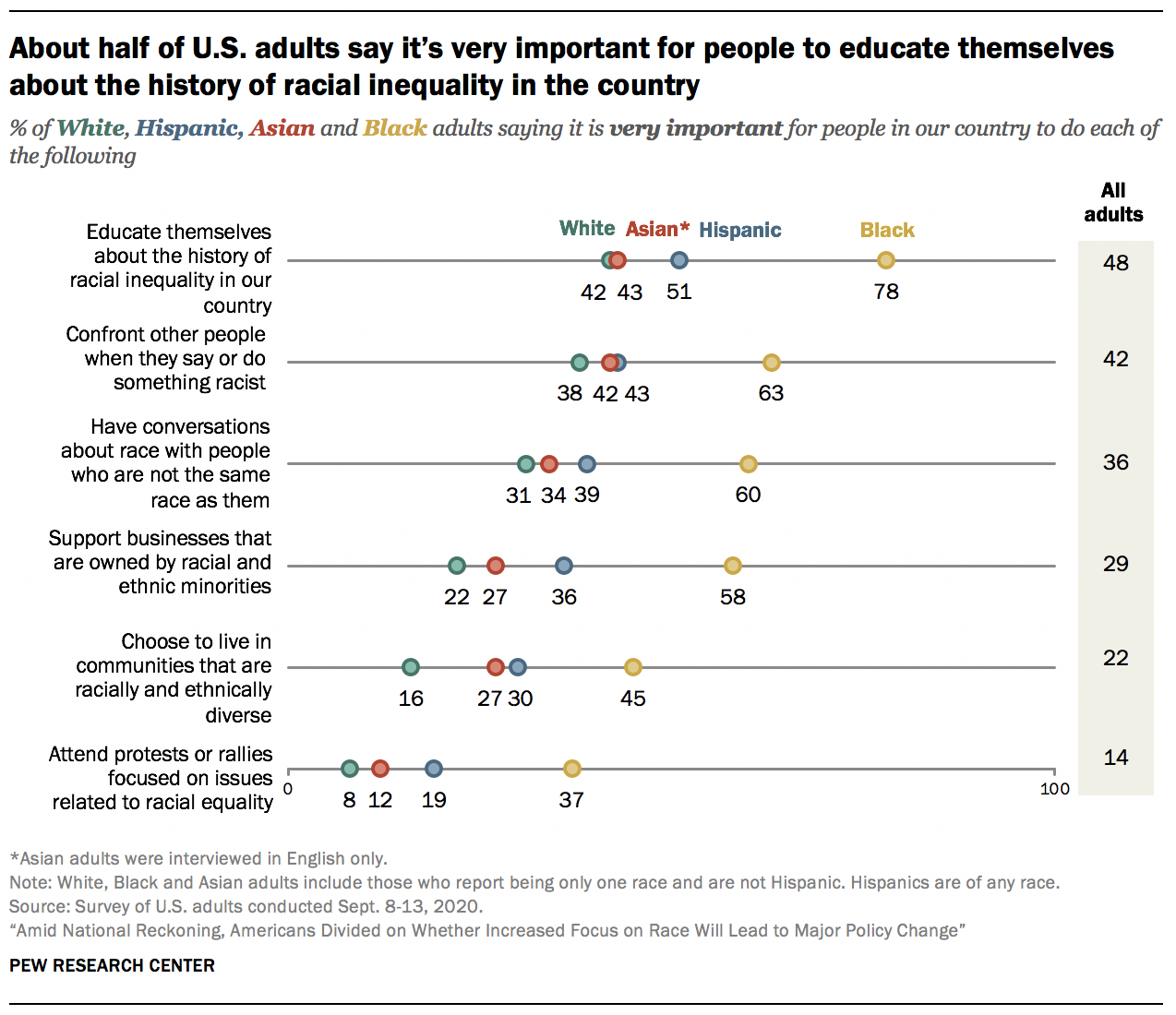
Black Americans are more likely than White, Hispanic and Asian Americans to say it’s very important for people in the U.S. to do each of the items asked in the survey. More than half of Black adults say it’s very important for people to educate themselves about the history of racial inequality in the country (78%), confront other people when they say or do something racist (63%), have conversations about race with people who are not the same race as them (60%) and support minority-owned businesses (58%). In contrast, about half or fewer White, Hispanic and Asian Americans say it’s very important for people to do each of the things asked in the survey.
Among White adults, those who identify with or lean to the Democratic Party are more likely than those who identify with or lean to the GOP to see each of the items as very important. For example, while about half or more of White Democrats say it’s very important for people to learn about the history of racial inequality in the country (68%), confront other people when they say or do something racist (58%) and have conversations about race with people who are not the same race as them (52%), only about a quarter or less of White Republicans see each of these as very important.
A growing share of Americans say the country hasn’t made enough progress on racial equality
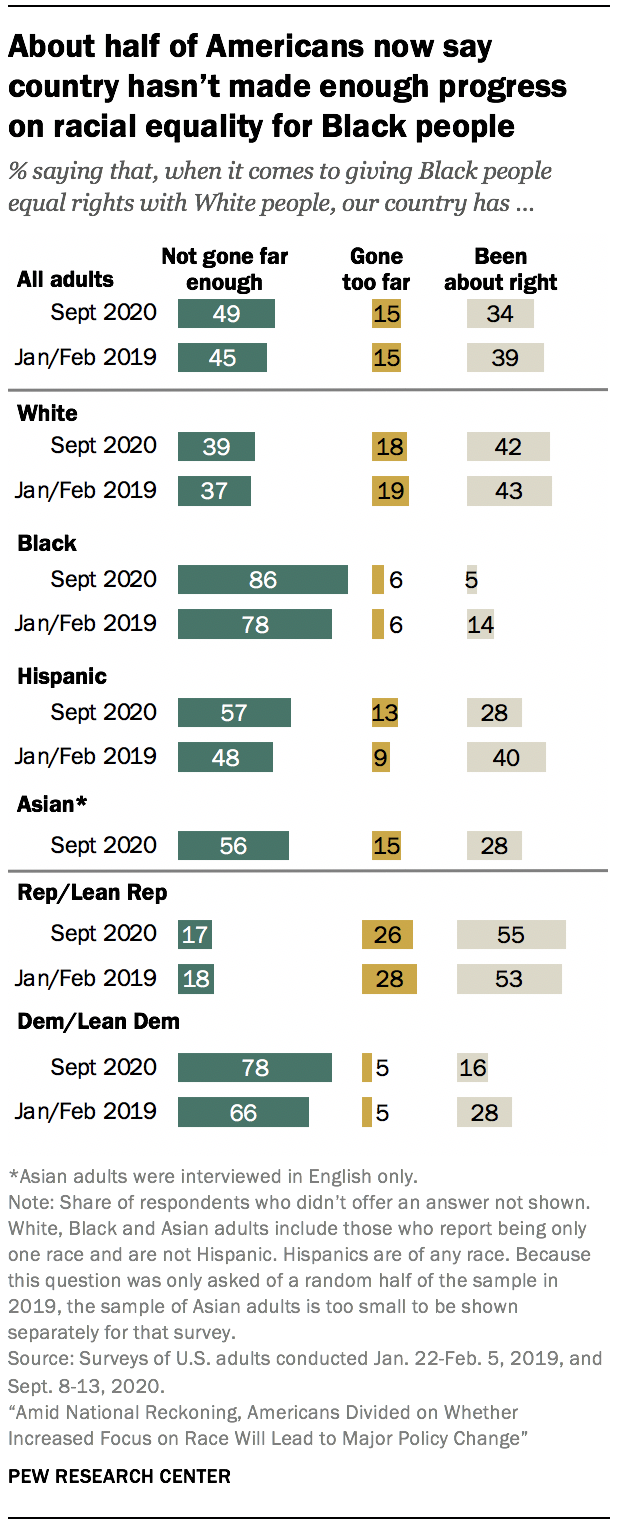
About half of Americans (49%) say the country hasn’t gone far enough when it comes to Black people having equal rights with White people, up from 45% who said this in 2019. This change reflects, in large part, changing views among Black and Hispanic adults and among Democrats across racial and ethnic groups. Overall, the views of White adults have not changed notably.
More than eight-in-ten Black Americans (86%) say the country hasn’t made enough progress when it comes to Black people having equal rights with White people. Smaller shares of Hispanic (57%), Asian (56%) and White (39%) Americans say the same. In early 2019, 78% of Black adults, 48% of Hispanic adults and 37% of White adults said the country hadn’t gone far enough.
The partisan gap in views of the country’s progress on racial equality, already striking in 2019, has widened, as a growing share of Democrats say the country hasn’t gone far enough when it comes to Black people having equal rights with White people. About eight-in-ten Democrats and Democratic leaners (78%) now say the country hasn’t gone far enough, compared with 66% in 2019. Views are virtually unchanged among Republicans and those who lean to the GOP.
White, Black and Hispanic Democrats are now more likely than in 2019 to say the country hasn’t gone far enough when it comes to Black people having equal rights with White people. Nine-in-ten Black Democrats now say this, compared with 82% who did so last year. About three-quarters of White Democrats (76%) and 72% of Hispanic Democrats also say the country hasn’t gone far enough in giving Black people equal rights with White people, up from 64% and 59%, respectively, in 2019. Just 12% of White Republicans and 34% of Hispanic Republicans say the country hasn’t made enough progress in this area. The share of White Republicans who say this is virtually unchanged from last year (15%).4
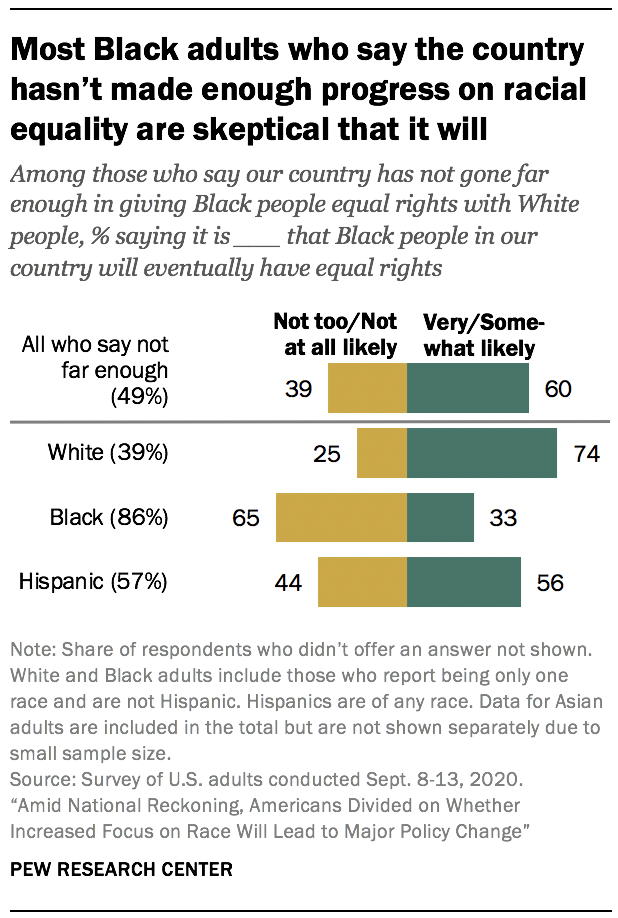
More than half of Black Americans express skepticism about prospects for racial equality
Most (65%) Black adults who say the country hasn’t gone far enough when it comes to Black people having equal rights with White people say it’s not too or not at all likely that the country will eventually achieve racial equality; this represents 57% of all Black adults. Far smaller shares of White (25%) and Hispanic (44%) adults who say the country has work to do in this area express skepticism that Black people will eventually have equal rights with White people in our country. Views on this are largely unchanged from last year.
No clear consensus on measures that would be very effective in reducing racial inequality
The survey asked those who say the country hasn’t gone far enough when it comes to Black people having equal rights with White people how much a series of measures would do to reduce this inequality. About half (48%) say more people participating in training on diversity and inclusion would do a lot. About four-in-ten say the same about redrawing school boundaries to create more racially and ethnically diverse schools (43%) and limiting the scope of policing to focus on serious and violent crimes (40%). Smaller shares say companies and organizations taking race and ethnicity into account in decisions about hiring and promotions (34%), colleges and universities taking these factors into account in admissions decisions (27%) and the U.S. government paying cash reparations to Black people in the country who are the descendants of slaves (20%) would do a lot to reduce inequality between Black people and White people.
Majorities of about seven-in-ten or more of those who say the country hasn’t made enough progress toward racial equality say most of the measures included in the survey would do at least some to reduce inequality between Black people and White people. The one exception is reparations: 48% say the U.S. government paying cash reparations to Black people who are the descendants of slaves would do at least some to reduce inequality and 51% say this wouldn’t do much, if anything at all.
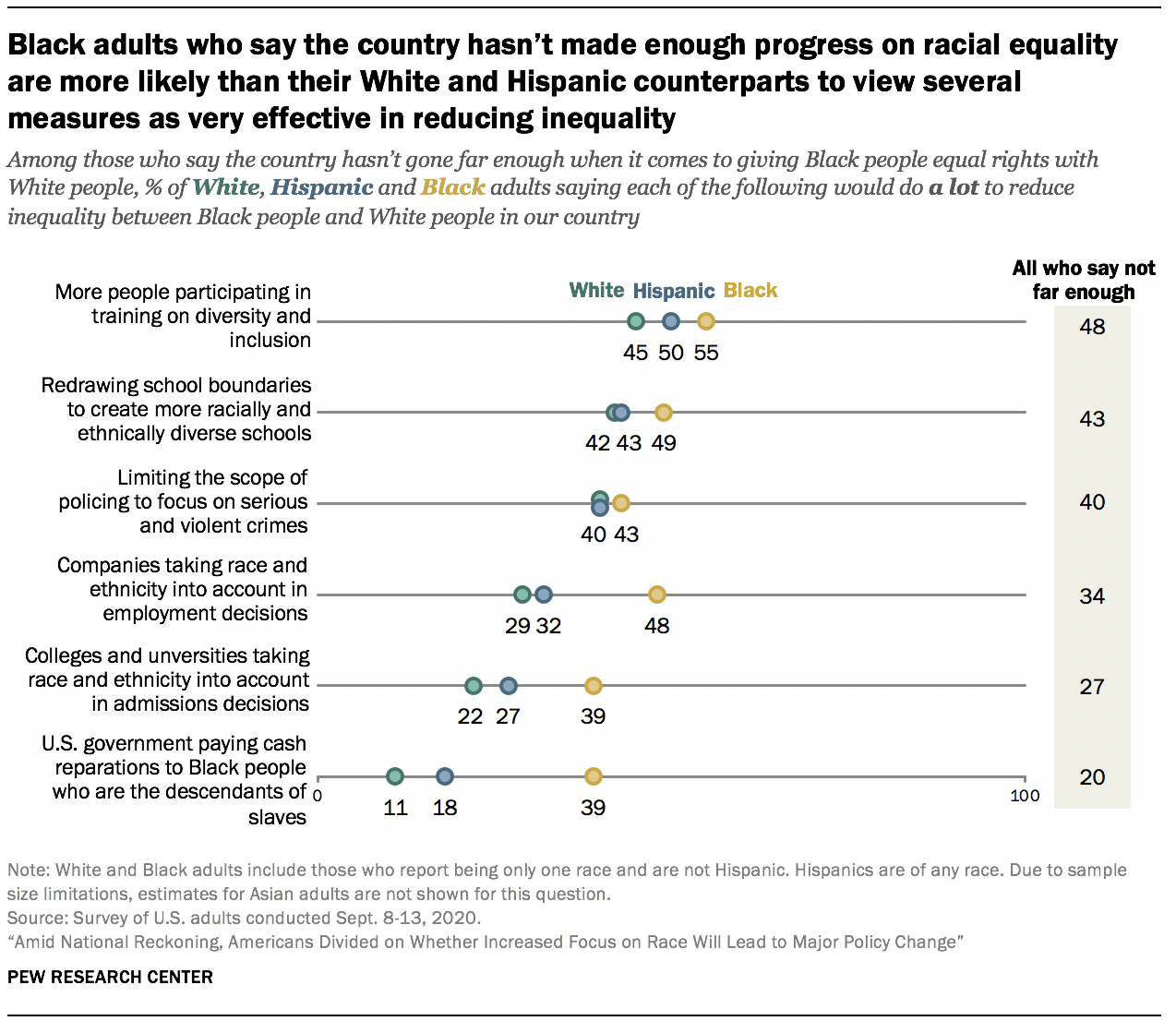
Black adults who say the country has work do to on racial equality are more likely than their White counterparts to say more people participating in diversity and inclusion training and redrawing school boundaries to create more racially and ethnically diverse schools would do a lot to reduce inequality between Black people and White people.5 And Black adults are more likely than both White and Hispanic adults to say companies and organizations taking race and ethnicity into account in decisions about hiring and promotions, colleges and universities taking these factors into account in admissions decisions and the government paying cash reparations to the descendants of slaves would do a lot.
Some racial and ethnic gaps persist when looking only at Democrats who say the country hasn’t gone far enough when it comes to equality for Black people. Some 47% of Black Democrats who say this see companies and organizations taking race and ethnicity into account as a very effective way to reduce racial inequality. About a third of White (33%) and Hispanic (35%) Democrats say the same. Black Democrats are also more likely than their White and Hispanic counterparts to say colleges and universities considering race and ethnicity in admissions decisions (39% vs. 24% and 30%, respectively) and cash reparations for Black people who are the descendants of slaves (38% vs. 13% and 19%) would do a lot.
White Democrats who say the country hasn’t made enough progress on racial equality between White people and Black people are more likely than their Republican counterparts to see each of the measures included in the survey as doing a lot, or at least some, to reduce this inequality. Still, half or more of White Republicans who say the country has work to do to address racial inequality say each of the items, with the exception of reparations, would do a least some to reduce inequality between White people and Black people in the U.S.
When it comes to the U.S. government paying cash reparations to Black people in the country who are the descendants of slaves, just 18% of White Republicans who say the county hasn’t made enough progress on racial equality say reparations would do at least some to reduce racial inequality, while 23% say they wouldn’t do much and 58% say reparations would do nothing at all to reduce racial inequality. Among White Democrats who say the country hasn’t made enough progress, 43% say reparations would do at least some to reduce racial inequality; 32% say they wouldn’t do much and 25% say reparations would do nothing at all.
Three-in-ten Republicans who say the country has work to do on racial equality say less focus on race would do a lot to reduce inequality
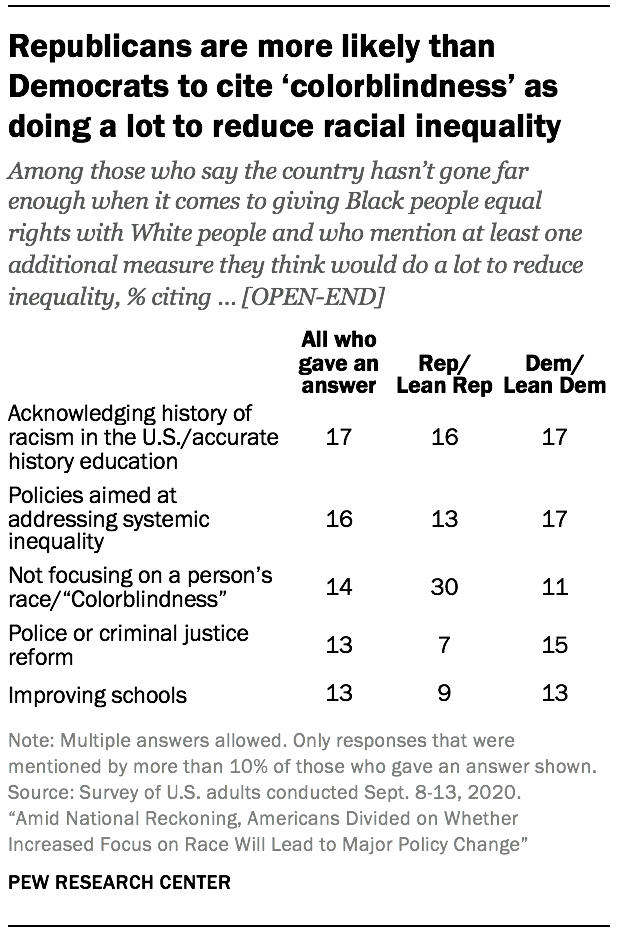
When asked if there are any other measures they think would do a lot to reduce inequality between Black people and White people in the U.S., 36% of those who say the country hasn’t made enough progress in this area volunteer at least one additional measure. Of those, 17% say acknowledging the history of racism in the U.S. and accurate education about this history would do a lot to reduce racial inequality; 16% give an answer related to policies aimed at addressing systemic inequality (such as universal basic income, tax reform and affordable health care); 14% say not paying so much attention to race; 13% mention something related to police or criminal justice reform; and 13% cite improving schools. About one-in-ten (9%) say increasing racial diversity, such as on corporate boards and among political leaders, would do a lot.
Among Republicans who say the country hasn’t made enough progress toward racial equality and volunteered an additional measure, 30% say paying less attention to race or being “colorblind” would do a lot to reduce inequality between Black people and White people; 11% of their Democratic counterparts say this. In turn, Democrats are more likely than Republicans to give an answer related to police or criminal justice reform (15% vs. 7%, respectively) and to say a new administration or new leaders (7% vs. 2%) would do a lot to reduce racial inequality.
Black Americans are more likely now than in 2019 to say being White helps and being Black hurts a person’s ability to get ahead
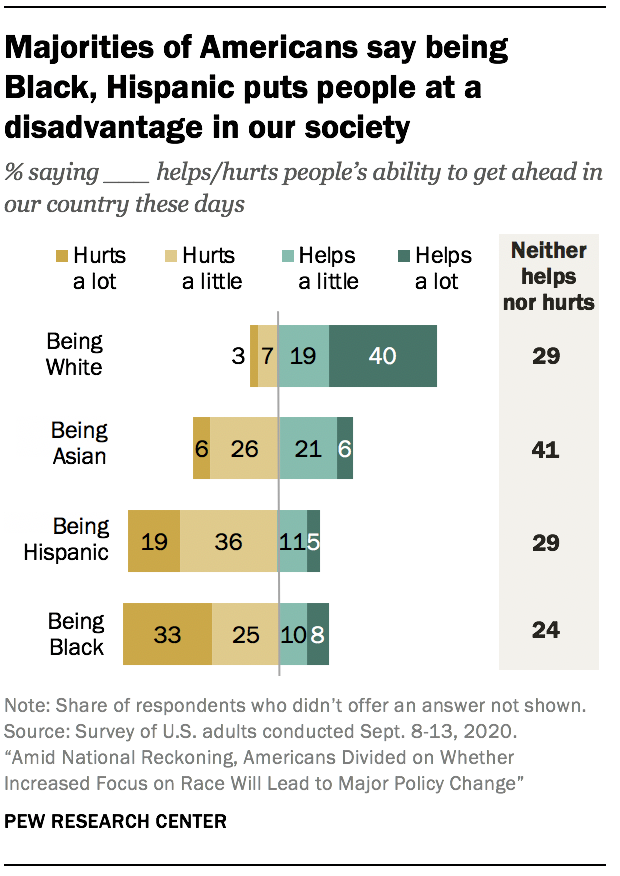
About six-in-ten U.S. adults (58%) say being Black hurts people’s ability to get ahead in this country at least a little and 55% say the same about being Hispanic. In contrast, most Americans (60%) say being White helps people’s ability to get ahead, with 40% saying it helps a lot.6 When asked about the impact of being Asian on a person’s ability to get ahead, the public is more divided: 27% say it helps, 32% say it hurts and 41% say being Asian neither helps nor hurts a person’s ability to get ahead.
Overall, views of how much being White, Black or Hispanic helps or hurts a person’s ability to get ahead have changed little, if at all, compared with 2019. But Americans are now more likely than they were last year to say being Asian hurts a person’s ability to get ahead: 32% say this, compared with 21% in 2019. In a June survey, 39% of U.S. adults said it is now more common for people to express racist or racially insensitive views about people who are Asian than before the coronavirus outbreak.
As was the case last year, Black (81%) and Asian (81%) adults are more likely than White (55%) and Hispanic (58%) adults to say being White helps people’s ability to get ahead in our country, although majorities across racial and ethnic groups say being White gives people advantages. The share of Black adults who say being White helps has increased by double digits since 2019, when 69% of Black Americans said this (72% of Black adults now say being White helps a lot, compared with 59% last year). Views on this have not changed significantly among White, Hispanic or Asian adults.
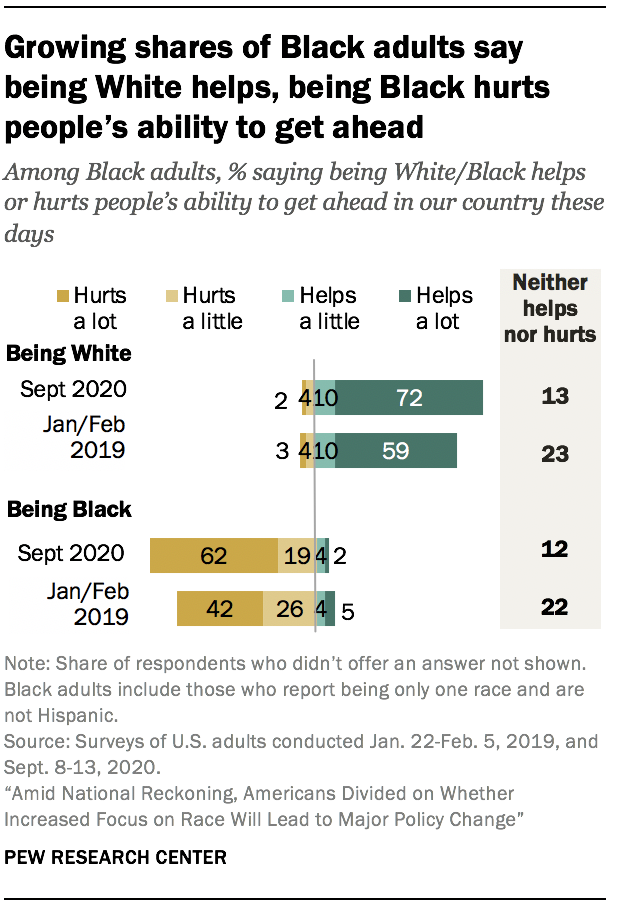
A growing share of Black Americans also say being Black hurts a person’s ability to get ahead in the U.S. at least a little. About eight-in-ten Black adults (81%) now say this, compared with 68% in 2019. In fact, most Black adults (62%) now say being Black hurts people’s ability to get ahead a lot, up from 42% last year. Hispanics are also more likely than they were last year to say being Black puts people at a disadvantage (57% say being Black hurts at least a little vs. 50% in 2019), while views on this have been more stable among White and Asian Americans.
There are wide partisan gaps in views of the impact of being White or Black on a person’s ability to get ahead, and these gaps remain when looking only at White adults. More than eight-in-ten White Democrats and Democratic leaners (85%) say being White helps at least a little. The same share says being Black hurts a person’s ability to get ahead. Among White Republicans and those who lean Republican, 34% say being White helps, while 18% say it hurts and 47% say it neither helps nor hurts a person’s ability to get ahead. A plurality of White Republicans (39%) also say being Black neither helps nor hurts, while 29% say it helps and 31% say it hurts a person’s ability to get ahead.
Amid coronavirus outbreak, a growing share of Americans say Black people are treated less fairly than White people when seeking medical treatment
Perceptions of how Black people are treated in America continue to vary widely along racial and ethnic lines. Two-thirds or more of Black adults say Black people are treated less fairly than White people in dealing with the police (91%); in hiring, pay and promotions (87%); when applying for a loan or mortgage (86%); in stores or restaurants (79%); when seeking medical treatment (76%); and when voting in elections (67%). Among White adults, 58% say Black people are treated less fairly in dealing with the police, while fewer than half say Black people are treated less fairly in the other areas asked about in the survey. The share of Hispanic and Asian adults who say Black people are treated less fairly than White people on each item falls somewhere in between.
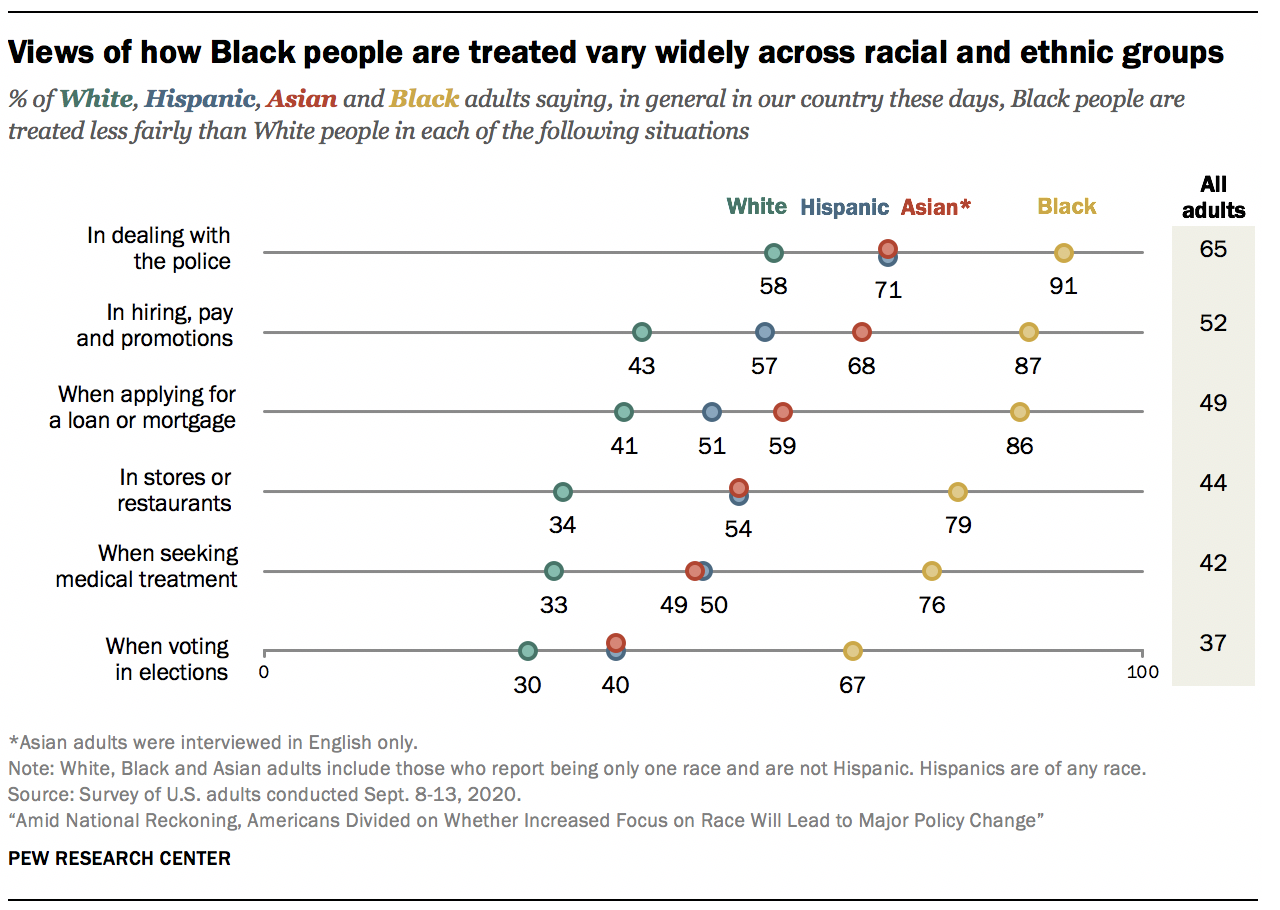
For the most part, perceptions of how Black people are treated in the U.S. have not changed since last year, with one notable exception: Americans are now nine percentage points more likely than they were in 2019 to say Black people are treated less fairly than White people when seeking medical treatment (42% say this now vs. 33% in 2019). There has also been an uptick in the share saying Black people are treated less fairly when applying for a loan or mortgage (49% vs. 45%).
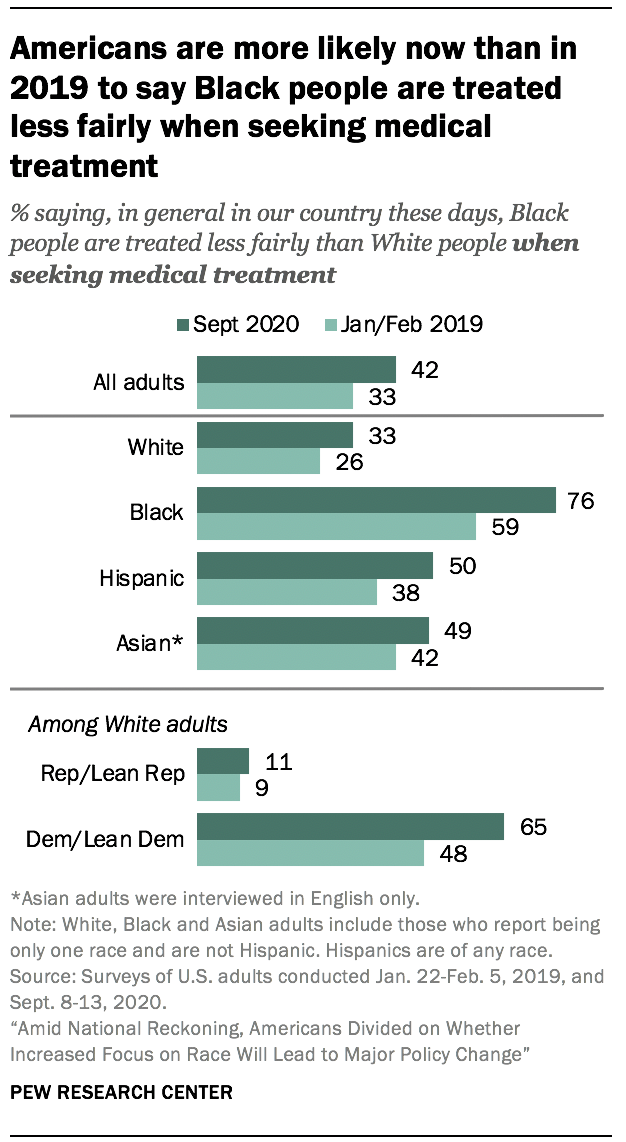
White, Black and Hispanic Americans are now more likely than in 2019 to say Black people are treated less fairly than White people when seeking medical treatment. About three-quarters of Black adults (76%) now say this, up from 59% early last year. A third of White adults and half of Hispanic adults say Black people are treated less fairly than White people when seeking medical treatment, compared with 26% and 38%, respectively, in 2019 (there is a 7 percentage point increase in the share of Asian adults who say this, but this change is not statistically significant).
Among White adults, perceptions of the treatment of Black people when seeking medical treatment have changed considerably among those who identify with or lean toward the Democratic Party: 65% of White Democrats now say Black people are treated less fairly than White people in this area, up from 48% in 2019. In contrast, White Republicans express similar views on this as they did last year (11% now say Black people are treated less fairly and 9% did so in 2019).
Majority of Americans continue to say people overlooking racial discrimination is a bigger problem than people seeing it where it really doesn’t exist
More than half of Americans (56%) say that, when it comes to racial discrimination, the bigger problem for our country is people not seeing racial discrimination where it really does exist; 43% say people seeing racial discrimination where it does not exist is the bigger problem. This is nearly identical to the shares who gave these answers in 2019.
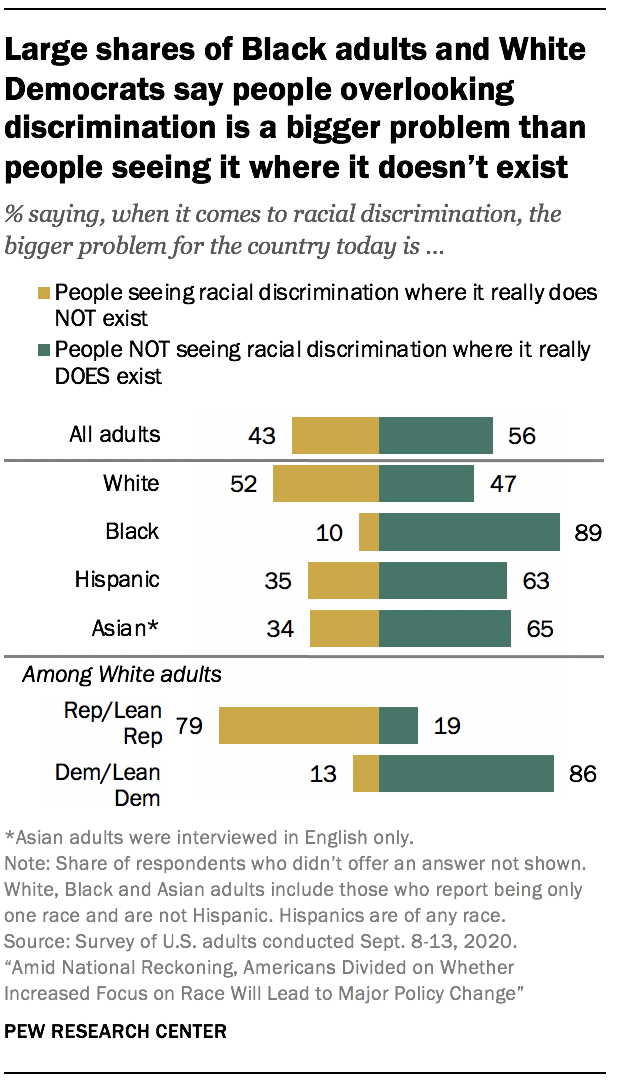
There has been some movement, however, in the views of some groups. About nine-in-ten Black Americans (89%) now say people not seeing racial discrimination where it really does exist is the bigger problem, compared with 84% last year. Meanwhile, the views of White, Hispanic and Asian adults have not changed significantly since 2019.
White adults, Democrats and Democratic leaners – 78% of whom said people overlooking racial discrimination was the bigger problem in 2019 – are now even more likely to express this view (an increase of 8 percentage points over 2019). The views of White Republicans and Republican leaners are largely unchanged from 2019.
Overall, about half of White adults (52%) say people seeing racial discrimination where it really does not exist is the bigger problem; 47% point to people overlooking racial discrimination. White adults ages 18 to 29 are more likely than older White adults to say people not seeing racial discrimination where it does exist is the bigger problem. A majority of White adults younger than 30 (61%) say this, compared with about half or fewer among their older counterparts. And while 61% of White adults with at least a bachelor’s degree say people overlooking discrimination is the bigger problem for the country, 42% of those with some college and 36% with a high school diploma or less education say the same.
Most Black Americans say there is too little attention paid to race and racial issues
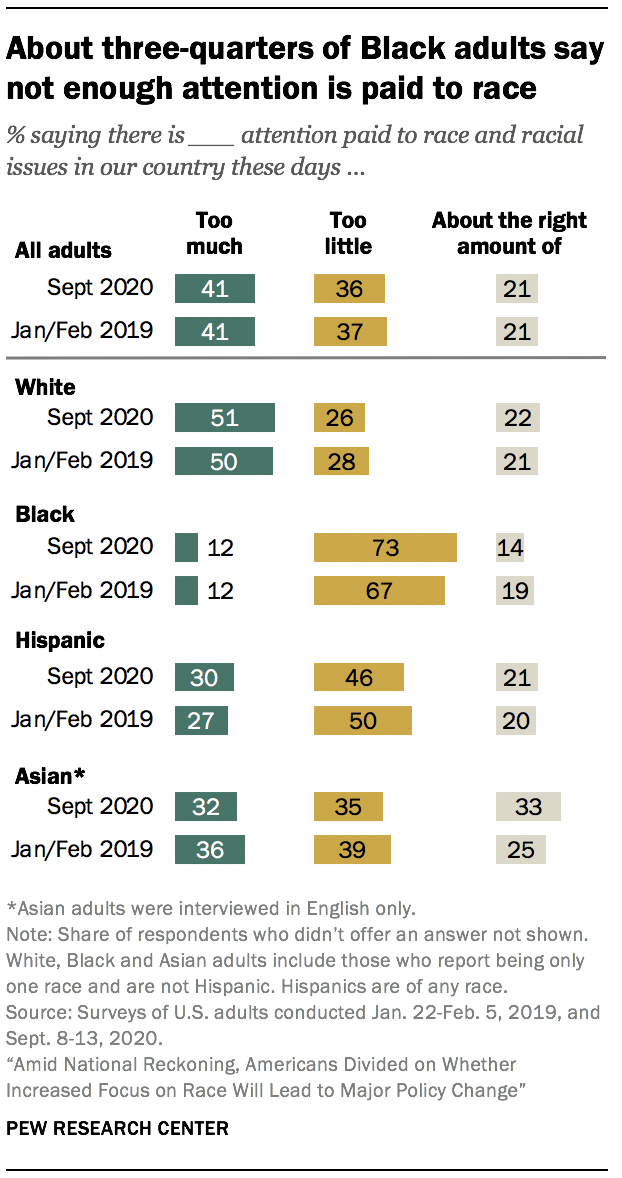
About four-in-ten U.S. adults (41%) say there’s too much attention paid to race and racial issues in the country these days; 36% say there’s too little attention and 21% say it’s about right. This is unchanged from 2019, but there has been movement among some groups.
Black Americans are more likely than in 2019 to say there’s too little attention paid to race and racial issues: 73% now say this, up from 67% early last year. Just 12% of Black Americans say there’s too much attention paid to these issues and 14% say it’s about right. Among Hispanics, more say there’s too little attention paid to race and racial issues (46%) than say there’s too much attention (30%) or the right amount (21%), while Asian adults are more divided. The views of Hispanic and Asian adults have not changed significantly since 2019.
As was the case in 2019, about half of White adults (51%) say there’s too much attention paid to race and racial issues these days, while 26% say there’s too little attention and 22% say it’s about right. White Republicans are far more likely than White Democrats to say there’s too much attention paid to race and racial issues in the country: 76% of White Republicans say this, compared with just 14% of White Democrats. About half of White Democrats (52%) – vs. just 7% of White Republicans – say there’s too little attention paid to these issues. The share of White Democrats who now say there’s too much attention to these issues is 7 percentage points lower than the share that did so in 2019. There is no notable change among White Republicans.